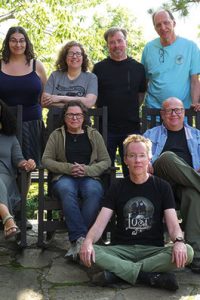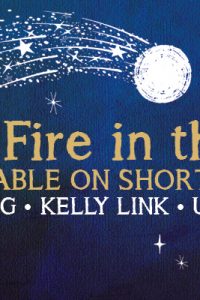Cory Doctorow: A Vocabulary for Speaking about the Future
 Science fiction writers and fans are prone to lauding the predictive value of the genre, prompting weird questions like ‘‘How can you write science fiction today? Aren’t you worried that real science will overtake your novel before it’s published?’’ This question has a drooling idiot of a half-brother, the strange assertion that ‘‘science fiction is dead because the future is here.’’
Science fiction writers and fans are prone to lauding the predictive value of the genre, prompting weird questions like ‘‘How can you write science fiction today? Aren’t you worried that real science will overtake your novel before it’s published?’’ This question has a drooling idiot of a half-brother, the strange assertion that ‘‘science fiction is dead because the future is here.’’
Now, I will stipulate that science fiction writers often think that they’re predicting the future. The field lays claim to various successes, from flip-phones to the Web, waterbeds to rocket-ships, robots to polyamory.
I believe that in nearly every instance where science fiction has successfully ‘‘predicted’’ a turn of events, it’s more true to say that it has inspired that turn of events. Gene Roddenberry’s set-dressers didn’t ‘‘predict’’ that Motorola’s engineers would make flip-phones that bore a more-than-passing resemblance to Star Trek’s communicators. Rather, Motorola’s engineers were trekkers. Flip-phones were ‘‘predicted’’ by Gene Roddenberry in only the most trivial sense – the same sense in which I ‘‘predict’’ that a pizza will arrive shortly after I order it.
Take away these trivial predictions and the number of genuine predictions – as opposed to inventions, such as Clarke’s geostationary orbits; or inspirations, such as Paul Krugman’s Foundation-inspired career in economics – from the literature underperforms a random-number generator.
It’s not just science fiction writers. The false belief in the predictive acumen of small groups of esoteric professionals is a recurring error in our society. Money managers, for example, almost never perform better than the market (and often underperform a straightforward index fund), but have a similar (and similarly undeserved) reputation as pickers of future winners.
Science fiction writers are pretty useless as fortune-tellers, but who needs fortune-tellers? ‘‘Prediction’’ implies a future that we hurtle towards on rails, prisoners of destiny. Having a route-map for the railroad is nice, but wouldn’t it be better if we could steer?
So what do science fiction writers do when they ‘‘predict?’’ Well, as I’ve already discussed, they inspire. You’d be hard pressed to find an aerospace engineer or roboticist or computer scientist or theoretical physicist or biochemist who isn’t a science fiction fan. The ways that we write about the possible futures (or impossible ones) get civilians all het up about those possibilities. Sometimes, they go out and make them real. Neal Stephenson tells me that during the dot-com heyday, new hires at high-tech startups were handed a copy of Snow Crash and told, ‘‘Read that, it’s our business plan. You start Monday.’’ I think there’s a nice little contrafactual story idea lurking in there about someone who turns up the following Monday with a Babylonian mind-virus pre-coded and ready to seed over the Web. Science fiction writers also inoculate. The dystopian tale isn’t just attractive because of its recurring fantasy of competent men starting over in a world wiped clean of old sins and sinful institution; it’s also a way for our collective imagination to seize hold of the potential for technology choices to harm us and the things we care about.
Science fiction writers reflect: Mary Shelley’s Frankenstein reflects back the anxiety her society felt about technology controlling its creators; Dracula reflects society’s aspiration for technology to best superstition (the vampire is defeated by means of electric light, telegraph, and other trappings of industrialization); Foundation reflects a New Dealer’s belief in scientific, technocratic social management; the Singularity reflects a societal fear that technology is disrupting our institutions so quickly that all stability is lost. If you want to find out how a society feels about its technology, read its science fiction.
Science fiction exposes: it can be hard to understand or even see upheaval when you’re in its midst. But just as a doctor will swab your throat and grow a sample of the flora she finds there in a petri dish until it’s large enough to identify, so too can a science fiction writer construct a petri dish of a world in which a single technology or idea can grow to fill it, providing a magnified look at something that was too small to be detected in situ.
Taken together, inspiring, inoculating, reflecting, and exposing are powerful capabilities, and much more interesting than mere prediction.
But the really interesting thing is how science fiction does its best tricks: through creating the narrative vocabularies by which futures can be debated, discussed, adopted, or discarded.
There are innumerable examples of this, but my favorite is George Orwell’s Nineteen Eighty-Four. Before this novel’s rise to prominence, any discussion of intrusive surveillance was singularly bloodless. ‘‘I don’t like how it would feel,’’ you could say, or, ‘‘It would change my behavior, make me self-conscious.’’ These are highly abstract, rather unconvincing arguments, especially when weighed against the technological narrative of surveillance: ‘‘With total information awareness, we will be as gods, our eye upon each sparrow as it falls from the tree. No evil deed will go unobserved and unpunished.’’ After all, it stands to reason that if you can watch everyone, you can see everything, and punish every bad deed.
But a science fiction writer, Orwell, has given us a marvelous and versatile vocabulary word for discussing this: now we can say, ‘‘Your surveillance idea is a bad one because it is Orwellian’’ – we can import all of that novel and its horrors with one compact word. The argument becomes a duel of narratives: the cool, impartial intelligence apparat that catches the bad guys versus the human reality of the corrupting nature of power and the way that our social contract and good behavior are eroded by constant surveillance and a culture of suspicion.
It’s this trick of putting blood and sinew into the argument that is the best that science fiction has to offer. It’s this that makes science fiction more relevant in an era of technological upheaval and social chaos. The future isn’t pre-ordained. It is contested and contestable. Science fiction isn’t a literature that tells you what will happen tomorrow. It is a literature that tells you how to prevent the bad tomorrows and usher in the good ones. It is an active and activist literature, with an agenda and a point of view. As we hurtle through our century of rapid change and economic, ecological, and technological disruption, it’s precisely the literature we need. Let the future catch up with science fiction – that’s precisely where it needs to be.
Cory Doctorow is the author of Walkaway, Little Brother and Information Doesn’t Want to Be Free (among many others); he is the co-owner of Boing Boing, a special consultant to the Electronic Frontier Foundation, a visiting professor of Computer Science at the Open University and an MIT Media Lab Research Affiliate.
From the January 2012 issue of Locus Magazine






> So what do science fiction writers do when they ‘‘predict?’’
> Well, as I’ve already discussed, they inspire.
>
> …robots to polyamory…
Some other poly-awareness activists tell me I’m exaggerating, but here’s my essay on Stranger in a Strange Land’s role in inspiring, starting a half century ago, what Newsweek called in 2009 “America’s next romantic revolution”:
http://polyinthemedia.blogspot.com/2010/08/polyamory-robert-heinlein-and-his-new.html
A lot of early sci fi did inspire scientists to create things, but today it seems like sci-fi writers look to scie tists for inspiration.
A lot of the cyberpunk stuff was using sci fi as an allegorical description of the modern era. Both satire and sci fi allow people to speak the truth without fear of reprisal from a hegemony.
Pingback:Cory Doctorow: A Vocabulary for Speaking about the Future – Locus Online
Pingback:Cory Doctorow: A Vocabulary for Speaking about the Future - Locus Online | What Are Futures
Pingback:Cory Doctorow’s craphound.com >> Blog Archive » Science fiction sucks at prediction, and that’s OK
Pingback:Cory Doctorow’s craphound.com >> Blog Archive » A Vocabulary for Speaking about the Future
Heh… Vingean.
Cory, you are one of my favorite writers for a number of reasons, but this subject was addressed by me over 40 years ago in my graduation thesis at university. My conclusion was that many (not all) SF predictions came true because a lot of SF readers were scientists and thought that some of the gadgets predicted would be really cool to have, so they came up with them.
On the other hand you yourself have predicted some things pretty well. In “Makers” the commonality of 3D printers for example. I just read about a guy, who has put together a cheap (~$3000) printer that uses free solar energy and the cheapest and most plentiful of substrates, silica, to build things out in the Sahara where there is a surplus of sunlight and sand. I don’t know if he ever read “Makers” but he seems to be implementing its ideas.
Pingback:Backup Brain » Blog Archive » Building sinew into language
Pingback:Writing My Dissertation So I Don’t Have To « Gerry Canavan
Once again Cory proves that his prominence as a thinker and SciFi writer is well earned. A terrific and thoughtful essay!
Pingback:Cory Doctorow: A Vocabulary for Speaking about the Future | Biblio | Scoop.it
Pingback:Locus Online Perspectives » Cory Doctorow: A Vocabulary for Speaking about the Future | Knowmads, Infocology of the future | Scoop.it
A very similar article that I wrote a few months ago: http://www.education4site.org/blog/2011/science-fiction-prediction-or-building-blocks-for-the-future/.
Main difference is that I don’t agree with Doctorow that sci-fi writers think that they are predicting the future. Seeing that Doctorow is a sci-fi writer and I am not, I may have to reconsider my view.
I just now saw a billboard up in Boston that said ‘Fiction made us promises. Science is delivering.’ Ad for iRobot.
I thought that was cool, having just read this piece maybe 20 minutes before that.
Alan, I should have known you’d be the first commenter on a Cory Doctorow post that contains the word “polyamory.” We polyamorists are nothing if not geeks!
We polyamorists are nothing if not geeks!
This post has got me thinking in the does-art-reflect-the-world or does-the-world-reflect-art kind of way. No answers or brilliant insights yet, but thanks for giving me pause.
Pingback:∂| Fantascienza.com Blog |uno Strano Attrattore » Blog Archive » Il lessico del futuro
In earlier years I, too, have wondered if for, example the 1984 vision helped reduce the possibility of its eventuation . There are so many other aspects that do not correspond to the novel’s trajectory however, that I have come to the conclusion that Orwell’s was just plain wrong and his projection stemmed from depression rather than an objective assessment of realities. But, that said, it was a work of fiction, and at the time of its release, a very impressive one!
He did, however, nail the human condition very accurately in “Animal Farm”.
Personally, after reading SF quite obsessively for some time I became disenchanted with the genre, finding science fact to be far more exciting and mind-blowing.
And now that I have at last found time for writing it is the creative interpretation of science fact and models emerging therefrom that is the source of fascination.
To get a handle on this check out my latest book “The Goldilocks Effect: What Has Serendipity Ever Done For Us?”. Its a very informal easy read and a free download in e-book formats from the “Unusual Perspectives” website.
You might find the evidence based predictions therein to be interesting.
Willie Ley wrote in 1945 that we would be on the moon in 25 years. I believed him and said so to our disbelieving neighbor, who apologized in 1969 to my mother for having made fun of me in 1945. I wish I could say I was with NASA by then, but I was teaching high school to disbelieving children.
Pingback:Wednesday Extra: Link-Dump « Type A Little Faster
Pingback:Doctorow on Manifesting | Manifest Future
Pingback:La literatura del cambio | IdentidadGeek
Pingback:Science fiction sucks at prediction, and that’s OK | Xeonix
I guess I’m disagreeing with the esteemed Doctorow in that science fiction is excellent at predicting concepts for the future, not necessarily predicting science for the future. The communicators in Star Trek showed what communication could become, and then it was up to scientists to make it happen. I do not believe that Roddenberry explained the use of satellites to send radio waves to bathe the world so that communication was possible in handheld devices. Roddenberry showed that if the technology was created for people to communicate with hald held devices then people would use it
Pingback:La science-fiction, un vocabulaire de l'avenir – Blog à part
Pingback:Sometimes You Get Lucky – Pluralistic: Daily links from Cory Doctorow